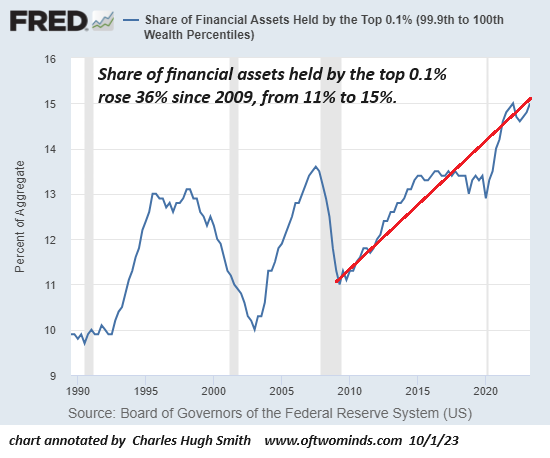All this grift, graft, predatory pricing, price-fixing and parasitic monopolizing costs the public and the economy dearly.
In the great scheme of civilization, governments arose to consolidate resources, wealth and power, and protect these scarce and valuable assets from outsiders. Outsiders included invading hordes, competing states and self-serving entities within the realm guided by one goal: to maximize private gain by any means available.
In the past, these entities included petty fiefdoms, warlords and brigands. In the present, corporations are the entities guided by one goal: to maximize their private gain by any means available. This pathological drive to profiteer, exploit and pillage goes by the polite term “increasing shareholder value.” (I’m sure the warlords and brigands would be jealous of the modern-day PR machinery wielded by corporations.)
The powerful central state is both a threat to warlords / corporations and a potentially unmatchable ally.
Should the warlord / corporation worm their way into the good graces of the state via bribes, gifts and other blandishments, then the state can legalize and enforce whatever predatory mechanisms they’ve established to fleece the public of their hard-earned wages.
In the modern iteration of warlord predation, this harnessing of the state to maximize private gains is called regulatory capture. In the old days, petty fiefdoms and warlords bought state protection by funneling a share of their profits to the monarch. (Brigands converted themselves from outlaws to respected warlords by the same path.)
In democracies, this sluicing of predatory gains to the state takes the form of campaign contributions to politicians and lavish legal lobbying via absurdly bloated speaking fees, private junkets on billionaire’s boats, seats on philanthro-capitalist foundations, and so on.
As Richard Bonugli and I discuss in our podcast on How Regulatory Capture is a Net Negative to Society,
The opportunities for grift are not a bug to those at the top of the democracy machinery, they’re a feature: how else can an opportunistic parasite gain wealth while “serving the public”?
In the old days, warlords exacted tolls at bridges and on pathways. Today, parasitic corporations stripmine the public with cartels, quasi-monopolies, price-fixing and predatory pricing mandated by the government. Look no further than Americans paying 7 to 10 times more for insulin than the citizenry in other developed nations for an example of how modern-day parasites maximize profits while delivering no additional value for the predatory 7X cost.
Theoretically, democracies are supposed to limit the pillage, predation and parasitic exploitation of the public by warlords–oops I mean corporations. But democracy is in effect a wide-open auction of favors in which corporations bid for loopholes inserted in 700-page congressional bills, regulatory tweaks that favor their interests at the expense of competitors and innovators that might threaten their monopoly, etc.
The revolving door between government agencies and the corporations they regulate / fund is so well-greased that it’s been normalized: ho-hum, another Pentagon official went to work as a lobbyist for a defense contractor, another bureaucrat retired and is now a lobbyist for Big Pharma.
All this grift, graft, predatory pricing, price-fixing and parasitic monopolizing costs the public and the economy dearly. Funding that could have been invested productively to serve the common good is sluiced into the private accounts of politicos, fixers, lobbyists, billionaires and other “shareholders” (i.e. the top 0.1%) where it piles up as dead capital, unavailable for any purpose other than the further maximization of private gain by any means available, which of course is led not by innovation but by regulatory capture, as innovation is risky while regulatory capture is like shooting fish in a barrel.
There is a systemic cost to the predation of regulatory capture: stagnation, decay and collapse. Bleed the productive populace dry and stifle competition to maximize private / corporate gains, and you end up hollowing out your economy and society, with easily predictable consequences: the parasites expire with the host.
When Did Our Elites Become Self-Serving Parasites? (October 4, 2016)

Here’s a chart of the effectiveness of regulatory capture in building fortunes. The top 0.1%’s share of financial assets has soared 34%% since 2009 while the bottom 50%’s share fell 26% from a meager 3.1% to a nearly invisible sliver of 2.3%.

Recent podcasts:
How Regulatory Capture is a Net Negative to Society (28:34 min)
Michael Douville and I discuss: 2008 Redux? Warning! (19:42 min)
My new book is now available at a 10% discount ($8.95 ebook, $18 print):
Self-Reliance in the 21st Century.
Read the first chapter for free (PDF)
Read excerpts of all three chapters
Podcast with Richard Bonugli: Self Reliance in the 21st Century (43 min)
My recent books:
The Asian Heroine Who Seduced Me
(Novel) print $10.95,
Kindle $6.95
Read an excerpt for free (PDF)
When You Can’t Go On: Burnout, Reckoning and Renewal
$18 print, $8.95 Kindle ebook;
audiobook
Read the first section for free (PDF)
Global Crisis, National Renewal: A (Revolutionary) Grand Strategy for the United States
(Kindle $9.95, print $24, audiobook)
Read Chapter One for free (PDF).
A Hacker’s Teleology: Sharing the Wealth of Our Shrinking Planet
(Kindle $8.95, print $20,
audiobook $17.46)
Read the first section for free (PDF).
Will You Be Richer or Poorer?: Profit, Power, and AI in a Traumatized World
(Kindle $5, print $10, audiobook)
Read the first section for free (PDF).
The Adventures of the Consulting Philosopher: The Disappearance of Drake (Novel)
$4.95 Kindle, $10.95 print);
read the first chapters
for free (PDF)
Money and Work Unchained $6.95 Kindle, $15 print)
Read the first section for free
Become
a $1/month patron of my work via patreon.com.
Subscribe to my Substack for free
NOTE: Contributions/subscriptions are acknowledged in the order received. Your name and email
remain confidential and will not be given to any other individual, company or agency.
| Thank you, Alexander P. ($50), for your magnificently generous Substack subscription to this site — I am greatly honored by your support and readership. |
Thank you, Matt V. ($50), for your superbly generous Substack subscription to this site — I am greatly honored by your support and readership. |
| Thank you, Kenneth T. ($50), for your splendidly generous Substack subscription to this site — I am greatly honored by your support and readership. |
Thank you, Cofed ($50), for your marvelously generous Substack subscription to this site — I am greatly honored by your support and readership. |


